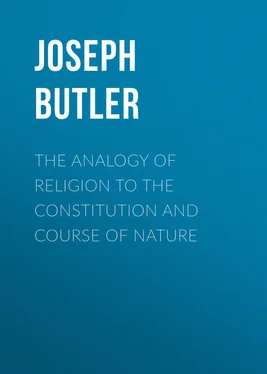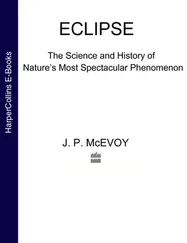Joseph Butler - The Analogy of Religion to the Constitution and Course of Nature
Здесь есть возможность читать онлайн «Joseph Butler - The Analogy of Religion to the Constitution and Course of Nature» — ознакомительный отрывок электронной книги совершенно бесплатно, а после прочтения отрывка купить полную версию. В некоторых случаях можно слушать аудио, скачать через торрент в формате fb2 и присутствует краткое содержание. Жанр: foreign_antique, foreign_prose, на английском языке. Описание произведения, (предисловие) а так же отзывы посетителей доступны на портале библиотеки ЛибКат.
- Название:The Analogy of Religion to the Constitution and Course of Nature
- Автор:
- Жанр:
- Год:неизвестен
- ISBN:нет данных
- Рейтинг книги:3 / 5. Голосов: 1
-
Избранное:Добавить в избранное
- Отзывы:
-
Ваша оценка:
- 60
- 1
- 2
- 3
- 4
- 5
The Analogy of Religion to the Constitution and Course of Nature: краткое содержание, описание и аннотация
Предлагаем к чтению аннотацию, описание, краткое содержание или предисловие (зависит от того, что написал сам автор книги «The Analogy of Religion to the Constitution and Course of Nature»). Если вы не нашли необходимую информацию о книге — напишите в комментариях, мы постараемся отыскать её.
The Analogy of Religion to the Constitution and Course of Nature — читать онлайн ознакомительный отрывок
Ниже представлен текст книги, разбитый по страницам. Система сохранения места последней прочитанной страницы, позволяет с удобством читать онлайн бесплатно книгу «The Analogy of Religion to the Constitution and Course of Nature», без необходимости каждый раз заново искать на чём Вы остановились. Поставьте закладку, и сможете в любой момент перейти на страницу, на которой закончили чтение.
Интервал:
Закладка:
This is Butler’s position. He confines himself to proving such an analogy between revelation and the daily course of things, as that nothing known in the universe can be offered in disproof of Christianity. The mode of warfare was new. Without professing to prove Christianity to be true, he demonstrates that it cannot be proved to be false; and that if it be even probable, the rejection of it is a gross folly and a tremendous hazard. Every objection against it he proves to be equally forcible against facts which constantly occur, and which all admit, though none profess to understand. Thus leaving the ramparts of the church to be guarded by the mighty men who had valiantly maintained its defence, he quietly walked out into the camp of the enemy, and spiked every gun!
It has been said that the whole argument of the “Analogy” seems to be built on Ecclesiasticus xlii. 24: “All things are double, one against the other, and God hath made nothing imperfect.” If it be so, it involves no disparagement to have received thus the seminal idea of this immortal work. Who else has so gloriously discerned and expanded the profound philosophy of the son of Sirac? Others have uttered sentiments which seem to involve the whole exposition of Butler. Origen affirms that “he who believes the Scripture to have proceeded from Him who is the Author of nature, may well expect to find the same sort of difficulties in it, as are found in nature.” Shall we assign to Origen the whole credit of the “Analogy”? As well might we bestow all our admiration for the delightful papers of Addison, in the Spectator, to the classical authors from whom he selected appropriate mottoes! By such a rule, the entire merit of this most Christian work of Butler should be attributed to the pagan Quintilian, from whom he derives the motto which so appropriately graces his title-page.
A rapid sketch of the outline of the argument will aid the student at his outset. He begins by taking for granted the existence of an intelligent Author and Governor of the universe. Then, from the conditions and changes observed in the visible world, he argues the folly of objecting to revelation on account of doctrines which do but declare the same general laws and the same principles of government. That there is this harmony, he proves; and hence the probability that the same sort of government will prevail hereafter, which prevails now. He demonstrates that man is under exactly such a probation in this world, and as to this world, as revelation affirms him to be under, as to the next; and that embarrassments produced by the doctrine of necessity, involve nature no less than religion. He then evinces the need that man should be placed in a state of training and trial, if he is ever to be qualified for better conditions; and that this world, as now governed, is exactly adapted to give that training, and to produce such a character as will insure happiness under any possible contingencies. This is the argument of Part I.
Proceeding to examine Christianity, he discusses its importance, its proofs, the unavoidableness of its containing strange things, the absurdity of expecting fully to comprehend its statements, and the abundance of its evidence for candid minds, though they are not, and ought not to be, irresistible. He answers not only the objections to Christianity, but the objections against its proofs; which he shows are very different things. Though he keeps rigidly to the refutation of objections, and nowhere meddles with the direct evidence of Christianity, yet, by removing every objection, he does in fact confirm its claims. This clearing away of objections, after the usual proofs are presented, crowns and completes the evidence. Thus the ultimate result of a study of his book is not only negative but positive; and such has been its effect on every candid and competent student.
We should remember that we have no right to require the removal of objections, and that therefore the whole of Butler’s work is in fact supererogatory; a concession and kindness to such as have doubts, either honest or captious. Our only rightful demand of Christianity is for credentials . It presents these in its nature, its miracles, its prophecies, its propagation, its influence, and its success. If these are competent, we should bow to its teachings. To suppose that we are capable of judging of the propriety of all God’s law, or even to understand his reasons for it, if they were disclosed, is absurd.
It is true we naturally presume that a revelation in words, and a revelation by natural objects and the visible order of things, would coincide; but to find out the fact or the extent of such coincidence, is not our first business. We are to weigh the testimony in favor of religion, embrace it, if sufficient, and attribute the obscurity of any part, to our present want of capacity. The solution of difficulties serves to confirm our faith in Christianity, but has no place in our ground of reception : and we have no right to wait for such solution, however painful and embarrassing may be the difficulties.
Another, and perhaps even more important, use of the “Analogy,” is to dissipate the prejudices and objections to Christianity which prevent a candid study of its evidences. These prepossess and poison the mind, and obstruct or abate the force of the best arguments. Few, if any, after a careful examination of the positive evidences of Christianity, conclude them to be inadequate. But many are they, who having heard objections which their scanty learning does not enable them to answer, and their no less scanty interest in the subject does not induce them to examine, or which their inclinations lead them to cherish, cast it all aside. In this way they relieve themselves from the labor of investigation, as well as their compunctions of conscience; while they indulge both their love of sin and pride of singularity.
An instance of the use of this book to such a mind, we have in the case of Chalmers. He had read, when a young man, several infidel productions. Their semblance of logic and learning, and supercilious confidence of style, disposed him to regard all religion as mere superstition. His mind was poisoned. Accustomed as he had been to the positive and precise reasonings of mathematics, he could not find similar proofs for Christianity. But he was induced, by some friends, to study Butler’s Analogy. This, as he expresses it, took Christianity “out of the class of unlikelihoods.” It brought him to the investigation, as if the evidence was neither plus nor minus. He examined the evidences as he would have done a declaration that Cicero weighed just one hundred and fifty pounds; open to the smallest proof or presumption on the positive side of the question. Delivered from prejudice, not only against Christianity but against its proofs, he soon saw the madness of deism, and immovably accepted the word of God, though he did not, at that time, feel its transforming power on his own heart. Long afterwards he writes, “I cannot render sufficient homage to the argument, which first, addressing itself to the subject-matter of Christianity, relieves it of all disproof, and pronounces it worthy of a trial; and then, addressing itself to the evidence of Christianity, relieves it of all objections, and makes good, to that evidence, all the entireness and efficiency which natively belong to it.” Years afterwards he said, “Butler made me a Christian.” That it did far more for him than to effect his change of sentiment, that it continued to be a light in his firmament, is touchingly told in the Preface of his Bridgewater Treatise, where he says, “I have derived greater aid from the views and reasonings of Butler, than I have been able to find, besides, in the whole range of our extant authorship.”
To the sincere believer in the word of God the study of Butler is of great use. Doubts are among Satan’s tried weapons, and often haunt the holiest, especially if of a contemplative turn. They see goodness oppressed, and vice rampant; the world ruled by wicked men, and truth making its way with difficulty. Their hearts are traitorous, their surroundings full of temptation, and the direct evidence of Christianity they may never have studied. To such the analogical argument comes with full power, meets a candid examination, and prevails.
Читать дальшеИнтервал:
Закладка:
Похожие книги на «The Analogy of Religion to the Constitution and Course of Nature»
Представляем Вашему вниманию похожие книги на «The Analogy of Religion to the Constitution and Course of Nature» списком для выбора. Мы отобрали схожую по названию и смыслу литературу в надежде предоставить читателям больше вариантов отыскать новые, интересные, ещё непрочитанные произведения.
Обсуждение, отзывы о книге «The Analogy of Religion to the Constitution and Course of Nature» и просто собственные мнения читателей. Оставьте ваши комментарии, напишите, что Вы думаете о произведении, его смысле или главных героях. Укажите что конкретно понравилось, а что нет, и почему Вы так считаете.












